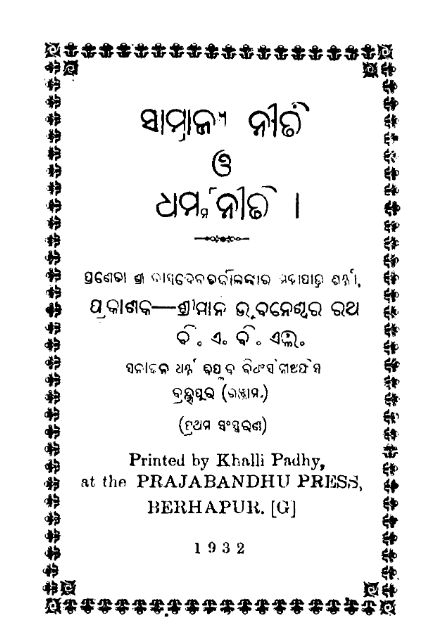Basudeba Mahapatra’s Samrajya Niti O Dharma Niti, published in 1932, is a seminal work that explores the intricate relationship between governance and moral principles. Written in Odia, this book offers a profound examination of political theory and ethical conduct, reflecting Mahapatra’s deep understanding of both historical context and contemporary issues. As India navigated the complexities of colonial rule during this period, this book provided a critical lens through which to view the intersection of politics and morality.
Samrajya Niti O Dharma Niti delves into two primary concepts: Samrajya Niti, which translates to the principles of governance or statecraft, and Dharma Niti, which refers to the ethical foundations of these principles. Mahapatra argues that effective governance must be grounded in moral values, suggesting that a ruler’s legitimacy derives not solely from power and authority but also from their commitment to justice and the welfare of the people.
The book is structured around the idea that the ruler’s responsibilities extend beyond mere administration. Mahapatra emphasizes that true leadership requires an understanding of ethical duties—what is often referred to in Indian philosophy as ‘Dharma.’ He posits that a ruler must embody virtues such as truth, compassion, and integrity, making decisions that reflect ethical considerations rather than self-interest.
The work is particularly significant due to its historical context. The 1930s were characterized by a growing discontent with colonial rule in India, and Mahapatra’s insights resonate with the challenges faced by Indian society at the time. By advocating for a governance model that prioritized ethical behavior, the author calls for a re-examination of leadership and authority within the colonial framework. His perspective suggests that moral governance can serve as a vehicle for social reform and national integrity.
Mahapatra draws upon various philosophical traditions, including Hindu scriptures, to bolster his arguments. He references ancient texts like the Arthashastra, which outlines principles of statecraft while respecting moral imperatives. Through these allusions, he situates his ideas within a rich tradition of Indian thought, underscoring the timeless relevance of ethical governance.
The comparison between ancient wisdom and contemporary politics elevates Mahapatra’s work, suggesting that modern leaders can learn from historical precedents. He challenges contemporary rulers to reflect on their actions within a moral framework and to consider the implications of their decisions on society at large.
While Samrajya Niti O Dharma Niti was written over nine decades ago, its themes remain remarkably relevant in today’s political landscape. In an era marked by political polarization and ethical dilemmas, Mahapatra’s call for moral governance serves as a reminder of the vital role ethics play in leadership. His work encourages both politicians and citizens to engage in a dialogue about the responsibilities of power and the importance of a compassionate society.
Books Info
| Books name | Samrajya Niti O Dharma Niti / ସାମ୍ରାଜ୍ୟ ନୀତି ଓ ଧର୍ମ ନୀତି |
| Author | Basudeba Mahapatra |
| No Of pages | 20 |
| Publisher | Sriman Bhubaneswar Rath |
| Publication | 1932 |
| Printed At | Prajabandhu Press |
| Distributor | NA |

